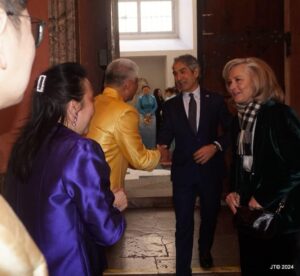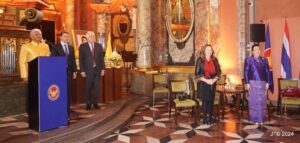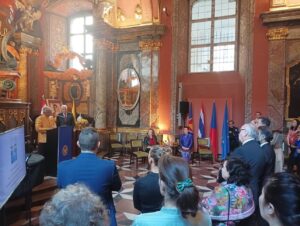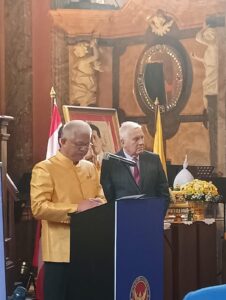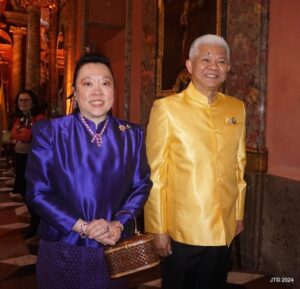- Hans Weber
- March 27, 2025
04.12.2024 Celebrating the Spirit of Thailand: National Day Festivities
On 4th of December H.E. Suwat Kaesook invited the representatives of the diplomatic corps and Thai locals in the Czech Republic to celebrate together on the premises of the Mirror Chapel in Prague.
The First Deputy Minister of Foreign Affairs of the Czech Republic Mr. Jiří Kozák spoke on behalf of the Czech Republic in the presece of President Vaclav Klaus.
Thailand’s National Day, observed on December 5th, is a time of grand celebration and deep reverence across the nation. This significant date marks the birthday of King Bhumibol Adulyadej, also known as Rama IX, who reigned for over seven decades and earned a revered place in the hearts of the Thai people. The day is not only a reflection of national pride but also a commemoration of the king’s visionary leadership and profound impact on the country.
The Legacy of King Bhumibol Adulyadej
King Bhumibol Adulyadej ascended to the throne in 1946, becoming Thailand’s longest-serving monarch until his passing in 2016. Revered as “the Father of the Nation,” his reign was characterized by a dedication to economic development, rural advancement, and social harmony. His numerous initiatives aimed at improving the lives of Thai citizens in rural areas are well remembered and continue to influence contemporary policies.
National Day is an opportunity for the nation to express gratitude and admiration for King Bhumibol’s enduring legacy. It is a time to reflect on his contributions towards fostering unity, enhancing educational opportunities, and promoting sustainable agricultural practices—all of which have left a lasting impact on Thai society.
Celebrations Across Thailand
National Day in Thailand is celebrated with a mix of official ceremonies, vibrant parades, and personal reflections. Across the country, the Thai national flag waves proudly, and homes and public buildings are adorned with photographs of King Bhumibol alongside other royal symbols. It is a display of deep respect and loyalty to the royal family that is deeply embedded in Thai culture.
The most prominent activities take place in the capital, Bangkok, where a range of ceremonial events mark the day. The Royal Plaza becomes the focal point for official celebrations, where government leaders, military officials, and dignitaries meet to lay wreaths and express their homage to the late king.
Religious ceremonies also play a crucial role during National Day, reflecting the deep spiritual connection of the Thai people. Monks lead ceremonies in temples around the country, offering prayers for peace, prosperity, and the well-being of the monarchy.
Community Activities and Parades
Across Thailand, communities come together to host local celebrations filled with cultural displays and traditional performances. Colorful parades featuring traditional Thai music, costumes, and dance fill the streets, creating a festive atmosphere. These events often highlight regional traditions, fostering a sense of unity while celebrating the rich diversity within Thailand.
Another heartfelt aspect of the celebrations involves acts of charity and community service. Many Thai citizens honor the memory of King Bhumibol by engaging in volunteer activities, reflecting his commitment to philanthropy. These acts of goodwill further strengthen community bonds and promote the king’s enduring message of compassion and generosity.
Creativity and Innovation Showcases
National Day also motivates showcases of talent and innovation amongst Thai citizens. Various exhibitions and fairs celebrate Thailand’s advancements in agriculture, craftsmanship, technology, and education. These events underscore the nation’s progress toward sustainable development and modernization, reflecting principles championed by King Bhumibol during his reign.
A National Reflection
While the origins of Thailand’s National Day are deeply rooted in honoring King Bhumibol Adulyadej, the day has evolved into a reflection of national identity, aspirations, and culture. It serves as a reminder of the ideals promoted by the revered monarch, including harmony, progress, and environmental stewardship.
In educational institutions, programs and discussions illuminate the significance of National Day, imparting a sense of history and purpose to younger generations. This reinforces national identity and encourages future leaders to emulate the values and aspirations instilled by past leaders.
Conclusion
Thailand’s National Day on December 5th is more than a commemoration of a beloved monarch; it is a vibrant celebration of national unity, pride, and cultural heritage. The festivities honor the profound legacy of King Bhumibol Adulyadej, reminding the Thai population of their shared journey and collective hopes.
Through ceremonies, parades, volunteer efforts, and communal activities, Thailand continues to cultivate a spirit of gratitude, community, and progress, celebrating not only the cherished memory of “the Father of the Nation” but also the nation itself, poised for a vibrant future grounded in its venerable past.
Recent posts
See AllPrague Forum Membership
Join us
Be part of building bridges and channels to engage all the international key voices and decision makers living in the Czech Republic.
Become a member